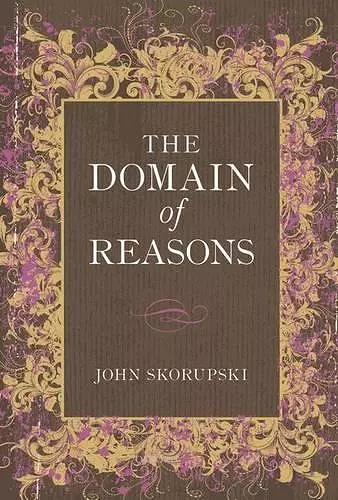The Domain of Reasons
Format:Hardback
Publisher:Oxford University Press
Published:25th Nov '10
Currently unavailable, and unfortunately no date known when it will be back
This hardback is available in another edition too:
- Paperback£56.00was £56.00(9780199664672)

This book is about normativity and reasons. By the end, however, the subject becomes the relation between self, thought, and world. If we understand normativity, we are on the road to understanding this relation. John Skorupski argues that all normative properties are reducible to reason relations, so that the sole normative ingredient in any normative concept is the concept of a reason. This is a concept fundamental to all thought. It is pervasive (actions, beliefs, and sentiments all fall within its range), primitive (all other normative concepts are reducible to it), and constitutive of the idea of thought itself. Thinking is sensitivity to reasons. Thought in the full sense of autonomous cognition is possible only for a being sensitive to reasons and capable of deliberating about them. In Part II of the book Skorupski examines epistemic reasons, and shows that aprioricity, necessity, evidence, and probability, which may not seem to be normative at all, are in fact normative concepts analysable in terms of the concept of a reason. In Part III he shows the same for the concept of a person's good, and for moral concepts including the concept of a right. Part IV moves to the epistemology and metaphysics of reasons. When we make claims about reasons to believe, reasons to feel, or reasons to act we are asserting genuine propositions: judgeable, truth-apt contents. But these normative propositions must be distinguished from factual propositions, for they do not represent states of affairs. So Skorupski's ambitious theory of normativity has broad and deep implications for philosophy. It shows how reflection on the logic, epistemology, and ontology of reasons finally leads us to an account of the interplay of self, thought, and world.
A book of surpassing philosophical erudition and tremendous range. It is a bold and stimulating work, simultaneously highly original and yet connected to a long tradition of philosophical thought. . . . it rewards careful reading and amply repays the investment of time and consideration. . . .It is an important work, one that eschews faddishness and stakes out original ground with elan and a rare depth of learning. In many respects, the last fifteen years have been something of a golden age for work on normativity. Skorupskis contribution ranks as among the most important written during this time. One need not agree with its fundamental approach, nor with the specific views for which it argues, to come away with a deeper understanding of normativity and of philosophy more generally. * Andrew Reisner, Philosophical Review *
It breathes new life into the Critical project initiated by Kant. We are fortunate indeed to have it. * Peter Railton, Philosophy and Phenomenological Research *
as historically rich as it is philosophically illuminating... The Domain of Reasons stands on a par with the most significant books on reasons, normativity and the mind published in recent years. It is a "magnum opus", and not only because of its size. * Hallvard Lillehammer, Notre Dame Philosophical Reviews *
ISBN: 9780199587636
Dimensions: 254mm x 181mm x 36mm
Weight: 1134g
558 pages